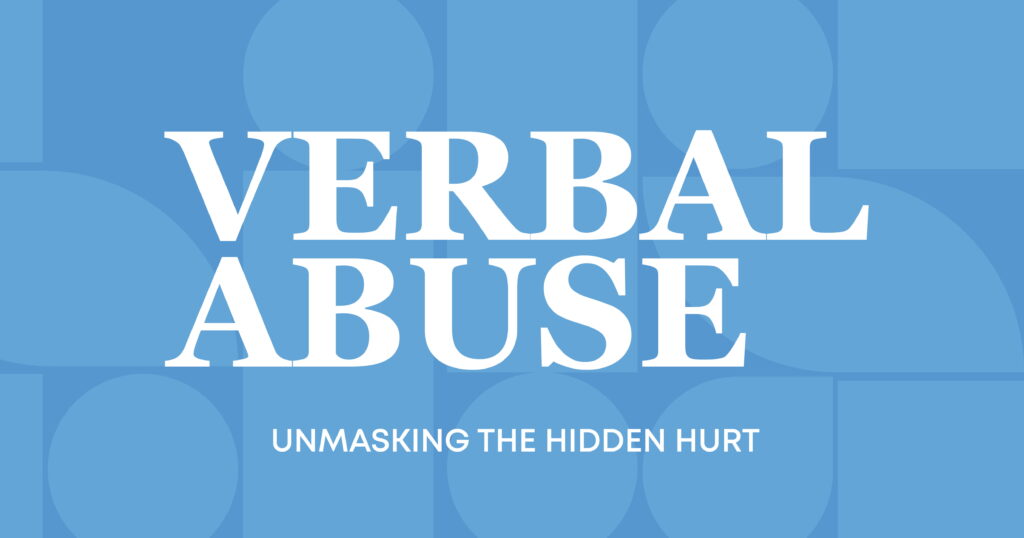Words are very important and powerful. They have the power to lift your mood or make you feel seen, loved, and appreciated. On the flip side, they can also break your mood and leave you with cuts that sometimes run so deeply, it takes days, weeks, or even years to recover from.
Physical abuse leaves scars which are obvious and can be seen. With emotional abuse, the effects are psychological and work in the shadows. The result of it is poor confidence, a troubled mind and little sense of self-worth. It’s often dismissed as “just words,” but in reality, it’s anything but. It’s a slow, steady form of control that can leave lasting damage if not recognized and addressed.
Understanding Verbal Abuse
Verbal abuse isn’t just someone getting angry and saying words off the top of their head during an argument. No! Rather, it’s a deliberate and controlled attempt to use words as weapons to hurt, control, and wear someone down over time. It’s important to remember that it’s not a one-off but a pattern.
Verbal abuse includes things like never-ending criticism, insults, humiliation, and threats that leave the victim in constant fear and self-doubt. It’s not like these things don’t happen in healthy relationships. Quite frankly, they actually do. However, they’re few and far between and usually come with an apology afterwards. With verbal abuse, it’s more common, and the goal isn’t resolution but control.
Common Forms of Verbal Abuse
Verbal abuse takes many forms, each designed to undermine the victim’s confidence and sense of reality:
| Type of Verbal Abuse | Description | Examples |
| Direct Insults | Open attacks on character, appearance, or abilities | Name-calling, cruel nicknames, degrading comments |
| Threats and Intimidation | Threats designed to scare or intimidate. | Threats of violence, abandonment, or consequences |
| Gaslighting | Manipulation that makes victims question their reality | “You’re crazy,” “That never happened,” “You’re too sensitive” |
| Constant Criticism | Relentless negative commentary | Nothing is ever good enough, perfectionism demands |
| Public Humiliation | Embarrassing or belittling in front of others | Mocking in social settings, sharing private information |
| Silent Treatment | Withholding communication as punishment | Ignoring, refusing to acknowledge presence |
Other Forms of Verbal Abuse include:
- Screaming or yelling to scare someone
- Using profanity to degrade or belittle
- Throwing shade about family, friends, or background
- Threatening finances or exploiting money dependence
- Making sexual or intimacy-related insults
Signs You Might Be Experiencing Verbal Abuse
It’s easy to miss at first, especially when it sneaks in slowly. Many victims start thinking it’s “just how they are” or that they somehow deserve it.
From the abuser:
- Blowing up over small stuff
- Refusing to talk things out calmly
- Making jokes at your expense
- Controlling conversations or outcomes
- Using guilt or shame to manipulate
How it affects the victim:
- Walking on eggshells constantly
- Losing confidence in decisions
- Feeling anxious or depressed most of the time
- Getting physical symptoms like headaches or trouble sleeping
- Pulling away from friends and family to avoid drama
The Psychological Impact of Verbal Abuse
When verbal abuse continues over a long period of time, it can cause lasting psychological damage. When a person suffers from emotional through verbal abuse, it can affect the person’s ability to form and keep relationships. It can also affect their professional success and their overall mental health.
Emotional and Mental Health Consequences
Long-term exposure to verbal abuse doesn’t just hurt feelings; it also affects the brain, especially the areas responsible for regulating emotions and responding to stress. More often than not, victims come down with post-traumatic stress disorder (PTSD), hypervigilance, and emotional numbness.
That constant alertness, like always waiting for the next explosion, puts the body in survival mode. Over time, it turns into chronic stress, and that stress shows up in so many different ways:
| Mental Health Impact | Immediate Effects | Long-term Consequences |
| Anxiety Disorders | Panic attacks, constant worry | Generalized anxiety disorder, phobias |
| Depression | Sadness, hopelessness, fatigue | Major depressive episodes, suicidal ideation |
| PTSD Symptoms | Flashbacks, nightmares | Complex trauma, dissociation |
| Cognitive Issues | Difficulty concentrating | Memory problems, decision-making impairment |
Long-Term Effects on Self-Esteem and Relationships
One of the most important aspects of verbal abuse is that the effects of it don’t just disappear when it ends. The words still play in the minds of the victims over and over again like a broken tape. After some time, they start affecting how the victims see people and how they relate to others.
Psychologists call it “learned helplessness.” Basically, when someone’s been torn down so often, they start to believe they can’t change things. It’s like getting stuck in a loop of “this is all I deserve,” which makes it really hard to walk away or even recognize what a healthy relationship should look like.
Long-term relationship impacts include:
- Difficulty trusting new partners
- Tendency to attract additional abusive relationships
- Challenges in setting and maintaining boundaries
- Fear of intimacy and vulnerability
- Confusion about what constitutes normal relationship behavior
How to Respond to Verbal Abuse
When it comes to dealing with verbal abuse, it’s not about fighting back or winning the argument. The end result of that is never positive and can make things blow out even bigger. What matters most is looking out for yourself and your mental health. Most importantly, it’s about slowly finding ways to take your power back.
Effective Communication and Boundaries
While it may seem counterintuitive, the most effective initial response to verbal abuse often involves strategic non-engagement rather than confrontation. This approach protects the victim while potentially disrupting the abuser’s expected patterns of control.
| Response Strategy | Technique | Purpose |
| Gray Rock Method | Become as uninteresting as possible | Reduces the abuser’s satisfaction from reactions |
| Boundary Setting | Clear, consistent limits on acceptable behavior | Establishes personal standards and expectations |
| Documentation | Recording incidents, dates, and witnesses | Creates evidence and validates experiences |
| Safety Planning | Preparing for escalation or departure | Ensures physical and emotional protection |
Practical boundary-setting techniques:
- Use “I” statements to express feelings without accusation
- Refuse to engage during episodes of verbal abuse
- Leave the room or situation when possible
- Seek witnesses or support during difficult conversations
- Lean on relationships with friends and family
Setting boundaries with an abuser won’t change their behaviour. Far from it because they rarely ever respond well to reasonable requests for respect.
Rather, boundaries help protect the victim’s emotional well-being and create the space for healing and planning. According to the National Domestic Violence Hotline, putting safety plans and maintaining support networks are very important keys to addressing any form of intimate partner abuse.
Communication strategies that protect rather than escalate:
- Avoid JADE (Justify, Argue, Defend, Explain) responses
- No need to talk too much. Instead give short responses like “okay” or “I understand”
- Don’t attempt to reason during active abuse episodes
- Focus on factual statements rather than emotional appeals
- Seek professional guidance for complex situations
Seeking Help and Support for Verbal Abuse at Hillside Horizon for Teens
Recovering from verbal abuse can be difficult and honestly, it’s even more difficult and exhausting when you try to get over it without any help. That’s why having people who actually understand these conditions in your corner makes a huge difference.

At Hillside Horizon for Teens, you’ll find individuals who understand the ups and downs of verbal abuse and emotional abuse and how they affect real life, like work, family, relationships, all of it. They can help you sort through the chaos and find a plan that actually works for you.
Contact Hillside Horizon for Teens today to begin the recovery process today. The support you need is just a session away.
FAQs
What are the common signs of emotional and psychological abuse in verbal relationships?
Verbal abuse isn’t always obvious. It could be constant criticism, little digs that don’t stop, or straight-up threats. Over time, it wears you down. You might start feeling anxious, low-key depressed, or like your confidence got stolen. A lot of people even pull back from friends or family just to avoid more drama.
How can manipulation and control manifest through verbal intimidation and insults?
Abusers know how to twist words so they’ll mix insults with intimidation to keep you scared and stuck. Sometimes it’s gaslighting, that’s making you question your own memory or sanity. Other times it’s guilt trips or shame bombs. The whole point is to chip away at you so much that you feel too small to push back or walk away.
What psychological impact does repeated verbal assault and belittling have on a person?
Getting torn down over and over leaves deep marks. It can feel like you’re carrying around invisible scars. Depression, anxiety, even PTSD-like symptoms are common. You might always feel “on edge,” find it hard to trust people, or second-guess yourself in every decision.
How can someone effectively respond to verbal abuse without escalating the situation?
Step one: protect your peace. Don’t waste energy trying to change the abuser. Instead, try things like setting clear boundaries, the ‘Gray rock’ method, Skip the JADE thing – Don’t justify, argue, defend, or explain. And always, always keep a support system or safety plan in your back pocket.
Where can individuals seek help and support when facing verbal abuse and intimidation?
Talking to a counselor or therapist is a solid first step. Hotlines are there 24/7 if things feel unsafe. And places like Hillside Horizon for Teens offer real support for young people going through this. You don’t have to deal with it alone.




